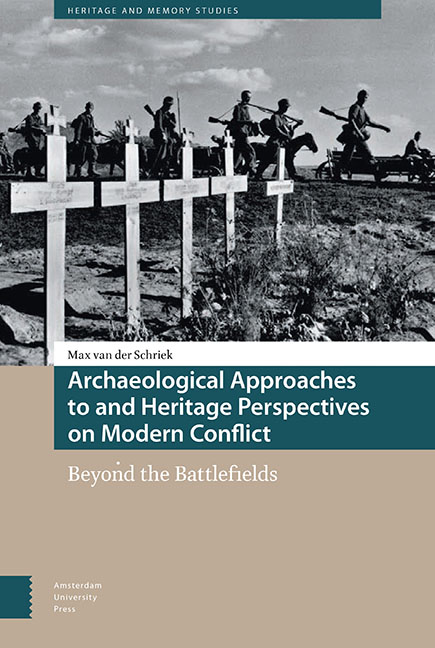Book contents
- Frontmatter
- Dedication
- Contents
- List of figures
- Acknowledgements
- 1 Introduction
- 2 Conflict archaeology
- 3 Landscape biographies of commemoration
- 4 Status quaestionis of conflict archaeology
- 5 Scientific and societal importance
- 6 The application of LiDAR-based DEMs
- 7 Summary and final debate
- Synopsis
- Appendix: WWII-related archaeological researches in the Netherlands (1984-2017)
- Bibliography
- Index
7 - Summary and final debate
Published online by Cambridge University Press: 27 April 2022
- Frontmatter
- Dedication
- Contents
- List of figures
- Acknowledgements
- 1 Introduction
- 2 Conflict archaeology
- 3 Landscape biographies of commemoration
- 4 Status quaestionis of conflict archaeology
- 5 Scientific and societal importance
- 6 The application of LiDAR-based DEMs
- 7 Summary and final debate
- Synopsis
- Appendix: WWII-related archaeological researches in the Netherlands (1984-2017)
- Bibliography
- Index
Summary
Abstract
In this final chapter, the main fields of tension for conducting conflict archaeology in the Netherlands are highlighted. Second, heritage management versus research potential management will be discussed. The increasing popularity of sites of modern conflict not only encourages new developments, but also raises new questions and problems. The third field of tension concerns site-oriented approach versus landscape approach. The archaeological potential of WWII-related landscapes of conflict can be surveyed by means of LiDAR-based DEMs, which let researchers place landscapes in their historical context. Best practice involves not only mapping the detected features but also comparing them and connecting them to existing archaeological and environmental data. Finally, a first draft for a research agenda on modern conflict will be presented.
Keywords: heritage management, research potential, site-oriented approach, landscape approach, research agenda
A number of broad international themes have been discussed in this study: battlefield archaeology, aviation archaeology, (illegal) metal detecting and the involvement of the general public to mention just a few. A wide range of methods and techniques are available for conflict archaeologists, but they cannot all be applied in the Netherlands, for various reasons. The development of a methodology and excavation skills is limited by several laws, for instance, which is why research methods other than excavations will be needed. The primary research question of this study was if conflict archaeology is at all possible in the Netherlands, given the laws and legislation. I have demonstrated that it is, in fact, possible, but as long as there is no legal infrastructure to support proper conflict archaeology (i.e. excavations), its most prominent strength are non-invasive techniques (such as LiDAR) for interpreting features of modern conflict and showcasing their significance and research potential.
In this final chapter, the main fields of tension for conducting conflict archaeology in the Netherlands are highlighted. First, community interest versus scientific interest will be discussed. The study of conflict has been of great interest to the general public from the start. In contrast, scientific interest in the field was, for a long time, limited, because landscapes of modern conflict were not widely recognized as important subjects of archaeological study. However, in recent years, awareness of the societal and scientific importance of conflict-related remains has grown. Nevertheless, their touristic value often differs from their academic value.
- Type
- Chapter
- Information
- Archaeological Approaches to and Heritage Perspectives on Modern ConflictBeyond the Battlefields, pp. 267 - 288Publisher: Amsterdam University PressPrint publication year: 2022

